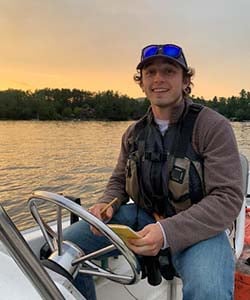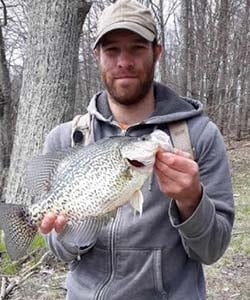Advance Your Skills
Explore the environment and train for a career in natural science.
Natural Resources & Ecology Master’s
In the M.S. natural resources and ecology program you will explore environmental science with a focus on natural resource issues. Current program strengths are in ecology and field biology and environmental policy and planning. The program offers both a research thesis option or an internship option.
What Will I Learn?
You will have the support and guidance of our exceptional faculty working at the top of their fields. Experiential learning opportunities are never far with easy access to the Adirondack Park and Lake Champlain Basin. In addition, you will gain mastery in:
- Ecological concepts and methods, experimental design, spatial analysis, taxonomy, statistical methods and applied issues
- Ecological data collection and sampling techniques
- Scientific research questions and methodology
What is Unique About Our Program?
Step into a field all your own and become a professional scientist with our natural resources and ecology program. With the 6-million-acre Adirondack Park and 490-square-mile Lake Champlain as your laboratory, you’ll immerse yourself in a science career.
What Are My Career Opportunities?
Develop the knowledge, skills, experience and credentials to pursue a successful career in natural resources such as park naturalist; environmental scientist; environmental planner; field ecologist; agency fisheries, forest or wildlife scientist and many others.
Graduates of our program are pursuing a variety of careers and fields including:
- Natural resources
- Environmental science/ecology
- Environmental planning
- Environmental conservation
- Park naturalist
- Forest biologist
- Aquatic/fisheries biologist
- Wildlife biologist
Natural Resources & Ecology Graduate Student Profiles
 Griffin Archambault, Class of 2027
Griffin Archambault, Class of 2027
- Advisor: Dr. Timothy Mihuc
“At a broad ecological scale, the two subjects that interest me the most are population dynamics — how and why wildlife populations change over time — and habitat selection — why species occupy the areas that they do. Narrowly, I am deeply fascinated by common loon site fidelity — returning to the same breeding territory year after year. I work as the research biologist at the Adirondack Center for Loon Conservation and came to Plattsburgh with the goal of developing into a more well-rounded wildlife biologist. When not studying, my other passions include fitness, hiking, camping, snowboarding, kayaking and everything else that comes with the outdoors.”
 Marshall Arnwine, Class of 2024
Marshall Arnwine, Class of 2024
- Advisor: Dr. Timothy Mihuc
“Working at the SUNY Plattsburgh Lake Champlain Research Institute, I am investigating the vertical distribution of zooplankton and other lower trophic organisms in Lake Champlain. Observed shifts in zooplankton abundance and biodiversity have occurred in the lake over the past few decades. Climate change and invasive species introductions have altered food availability, water temperature, and predation risks associated with Lake Champlain biota. These factors can influence the vertical distribution of lower trophic organisms, affecting the structure of the lake food web.”
 Meghan Bargabos, Class of 2024
Meghan Bargabos, Class of 2024
- Advisors: Dr. Mark Lesser and Dr. Danielle Garneau
“At Plattsburgh, I’m able to take advantage of the outdoors as my classroom, and immerse myself in the fascinating environments nearby. My research primarily focuses on wildlife and forest ecology, looking at how wildlife respond to differences in forest structure and disturbance history at the Altona Flat Rock, an incredibly unique jack pine barrens ecosystem. I also teach a section of general ecology lab through a teaching assistantship, which has been a great experience that I feel I’ve gained a lot from. When I’m not in the field or in the classroom, I love to hike, ski, fish, and point out cool things I see outside.”